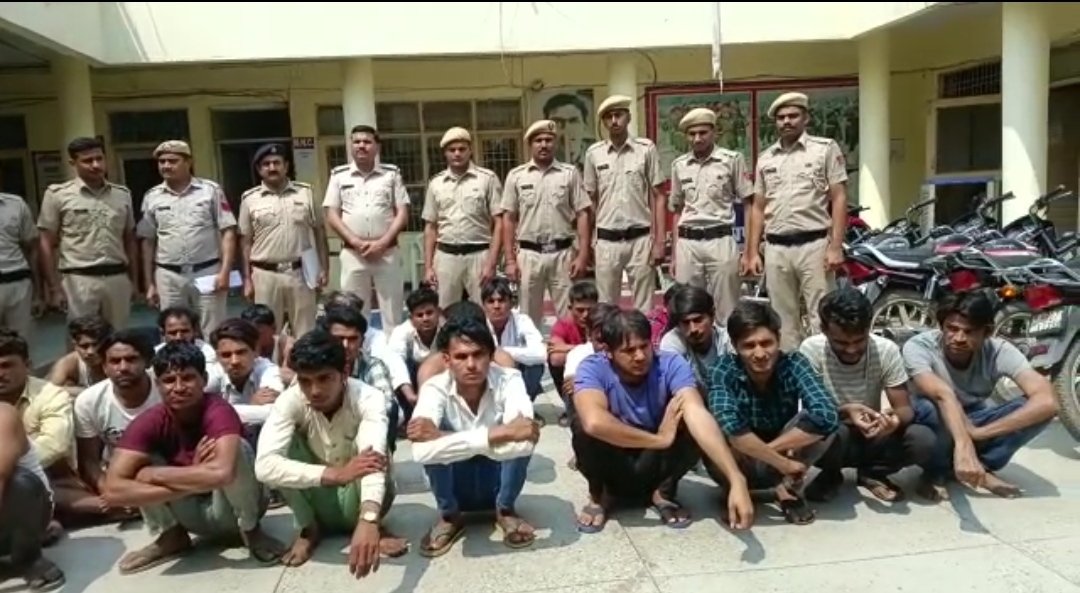

Haryana police have nabbed cyber-criminals of Nuh who had a pan-India reach
Following an extensive interrogation of 66 cyber criminals nabbed during a major raid in 14 villages of Nuh in Haryana on April 27, the police has unearthed pan-India cyber frauds to the tune of Rs 100 crore linked to these criminals. Around 40 top investigators from Haryana worked and traced 28000 cases which involved these criminals. These cases are registered in 35 Indian states and were traced to these criminals by Indian Cyber Crime Coordination Center of the Union Ministry of Home Affairs.
These thugs used to cheat people across the country with fake SIM, Aadhaar Cards etc. and used to deposit money in fake bank accounts to avoid arrest. It was on the intervening night of April 27/28 that Haryana carried out the country’s biggest raid against cyber crime in Mewat popularly called Jamtara of North. The area inhabited primarily by Meo Muslims spreads across Rajasthan and Haryana and has one of the lowest literacy and highest crime and poverty rates in the country.
102 teams of 5000 cops raided 14 villages of the Nuh district(Haryana) simultaneously. During this raid, around 125 suspected hackers were detained. Out of these, 66 accused were identified and arrested. All were produced in the respective Courts and taken on remand for 7 to 11 days.
Following the arrest, in order to unearth the whole nexus, Director General of Police, Haryana P.K. Agrawal deployed a team of 40 Cyber Experts from all across Haryana to carry out interrogation. Sustained Interrogation of the cyber criminals apprehended revealed their modus operandi and information about sources of fake SIMs and bank accounts. The mobile phones and SIM cards seized during the raid were also technically examined and relevant details were also sought from TSPs/ISPs, Banks, NPCI, UPI Intermediaries, UIDAI, DoT, social media platforms like Facebook, WhatsApp, etc.
“Already 1346 FIRs have been registered against these cyber fraudsters across the country. The details of these cyber criminals are being sent to concerned states to fix the culpability of these Cybercriminals. The investigation also revealed information about 219 accounts of private and public sector banks and 140 UPI accounts which were being used for committing cyber frauds,” Nuh SP Varun Singla told Indianarrative.com who headed the entire operations.
It may be noted that it was found that these bank accounts were mainly found to be activated online and that too by defrauding gullible people on the pretext of providing a job and then taking their credentials such as Aadhar card, PAN card, mobile number and getting an online KYC done. Apart from this, 347 SIM cards activated from Haryana, West Bengal, Assam, Rajasthan, Uttar Pradesh, Bihar, Odisha, Madhya Pradesh, Delhi, Tamil Nadu, Punjab, North East, Andhra Pradesh and Karnataka circles of telecom companies have also been unearthed which were being used by these thugs for cybercrime. During the investigation, the source of fake SIMs and bank accounts has been found to be mainly linked to Rajasthan’s Bharatpur.
The cyber criminals, who are in the age bracket of 18-35 years, have disclosed that they normally used to work in a group of 3-4 persons. They have also revealed that fake bank accounts, fake SIM cards, mobile phones, cash withdrawal/disbural and technical services such as posting an advertisement on social media websites were provided by only a few handful of individuals in a village after charging their commission fee ranging from 5% to 50% of the fraud amount. The cyber criminals mainly used Common Service Centres for cash withdrawal while some other used ATMs installed in different villages for same.
Modus Operandi
According to investigations these fraudsters would lure victims with attractive offers of sale on products like bikes, cars, mobile phones etc. by posting misleading advertisements on Facebook Bazaar/OLX. The unsuspecting victim then called the fraudster on the given fake mobile number and the fraudster cheats the victim on the pretext of courier charges, transportation of product etc but the product never gets delivered. These fraudsters also used to post an advertisement on social media platforms offering work from home mainly related to packaging of Natraj pencils, promising an earning of Rs 30,000 per month and cheat gullible people on the pretext of registration fee, packing materials, courier fee etc.
Similarly, cyber fraudsters used to check random number series in UPI apps to get the names of victims registered against those numbers on those Apps. The fraudster would then impersonate as some friend/relative of those unsuspecting victims and request them to receive payment on their behalf on one or the other pretext.
They then used to commit fraud by sending fake payment messages and getting the real money transferred to their accounts before the victim found something amiss. Similarly, on the pretext of buying old coins, gullible people were duped of huge sums of money.
The cyber criminals were also duping victims through sextortion crime by creating attractive profiles on social media platforms and luring the victims to come on a video chat where they carry out screen recording of the victims in compromising positions and then extort huge sums of money from them.
Asserting that India will not rest until "justice" is pursued, Prime Minister Narendra Modi on…
Prime Minister Narendra Modi observed a moment of silence to pay tribute to those who…
All India Institute of Medical Sciences, Raipur successfully performed its first Swap Kidney Transplant, also…
Following the deadly terror attack in Pahalgam, tensions between India and Pakistan have further escalated…
An encounter broke out between security forces and terrorists in Jammu and Kashmir's Udhampur district,…
Canadian leaders have strongly condemned the recent terror attack in Pahalgam, Jammu and Kashmir, which…